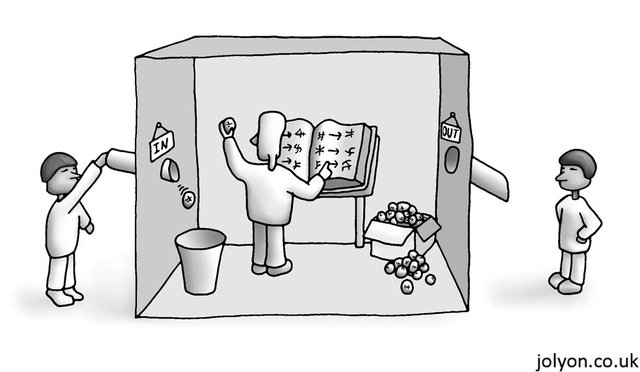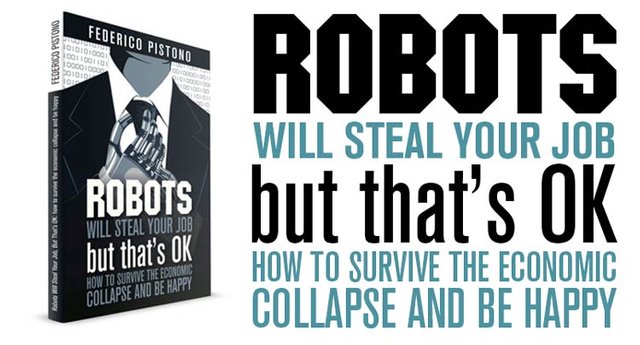Chapter 5: Intelligence | Robots Will Steal Your Job, But That's OK
Dear friends,
We continue our journey into the future of technology, automation, and the economy. Last Thursday we left off at Chapter 4: Information Technology, and today I'm publishing in full on Steemit the fifth chapter of my book Robots Will Steal Your Job, But That's OK.
Happy reading and follow me on @federicopistono to get updates on future chapters!
Chapter 5: Intelligence

There is a great deal of confusion regarding the meaning of the word intelligence, mainly because nobody really knows what it is. There are attempts to define this word, but they fall short when confronted by logic and informed questions. The Oxford English dictionary defines it as follows:
Intelligence [ɪnˈtɛlɪdʒəns]: The ability to acquire and apply knowledge and skills.
Given this very broad definition, one can easily include animals, particularly great apes, into the category of “intelligent” beings. We can also include computer programs. Think of Google. It acquires knowledge (crawls web pages) and applies skills (returns search results based on the knowledge acquired). A hint of what it means to be intelligent could emerge from the very etymology of the word, as it comes from Latin intellegentia, or “the act of choosing between” Hence, we could update the definition to “the ability to acquire knowledge, apply skills, and make informed choices”
Most people, when using common sense, would not regard machines to be “intelligent” in any way. Sure, they can make choices based on deterministic algorithms or probabilistic events, but they do not understand anything. Machines do not understand what they are doing or why they are doing it. It sounds preposterous to use the very word “understand" when dealing with machines. It simply does not apply to them. Whatever they are doing, it is their thing, and we are different from them.

This is the argument that is most prevalent among the general public, as well as within academic circles. There is a famous example called The Chinese Room[1] that illustrates this concept, but I think it is quite boring. I would like to propose a slightly different one, a personal story.
A few years ago, I was walking through the corridors of my university when I encountered a friend of mine. He seemed quite euphoric, so I asked him what the fuss was all about. He was laughing like crazy and did not reply, which made me even more curious. After catching his breath he said that the scores of the last test were out. See, a few days before he completely forgot we had this test and he took it without being prepared. He used to sleep in class too, so there was no chance of him getting some answers right using common sense.
“Well?” I asked him.
“I had no freaking idea what was going on there. Then I noticed it was a multiple-choice test. I just put AC/DC over and over, top to bottom.”

I gave him a picardian facepalm.[2]
Then he cracked up again. “Dude, I got 87%! Second best in the class!".

What can we learn from this anecdote? The dubious hypothesis of divine intervention by the God of heavy metal aside, it is clear he did not understand anything that was on that test. But to the eyes of the Professor, he was smart. In fact, he was the second smartest person in the whole class, at least as far as that subject was concerned. But just because one gets the answers right, it does not mean that they understood anything. It may be that they got lucky. Or maybe they knew how to mechanistically apply a set of rules to get the results. However if you changed the questions just slightly, they would fail miserably. Some people call this semantics (from Greek semantiká, neuter plural of semantikós), which is the study of meaning. But what exactly gives meaning? Can we quantify meaning objectively? I do not think we can. Things, situations, and phrases are all inert. They have no purpose, no intrinsic significance. It is us that gives them meaning. If you do not believe me, try this experiment. Take a €20 bill (or your equivalent) out of your wallet. It is just a piece of paper. A thin layer of cellulose with some ink imprinted on it. By itself, it has no value, no meaning, nor purpose. Now throw it out on the street. I can tell you, it is not going to sit there for long. That is because we give it meaning. We give it value it through a collective agreement. But the paper bill does not really care if it stays there, or if it is picked up.
Now, let us apply this to computers. They can certainly act intelligent. They can get the correct results, in some cases with much better performances than many humans, even with high-level skills such as language manipulation, puns, and musical compositions (more on this later in this chapter). But how can we know if they really mean what they say, or if they understand any of it. I think the answer is that we do not know. And it could be that we cannot know, because the question does not even apply to them.
Maybe intelligence is not an absolute property that exists independent from its environment, and it is us that ultimately see intelligence in others. Or, as Rodney Brooks put it:[3]
“Intelligence is in the eye of the observer”
This is certainly a fascinating topic to dig into, and several excellent books have been written about it[4]; but it has little relevance when talking about how machine “intelligence” has profoundly changed our culture, and how it will dramatically change our economy and our way of living. From a purely practical point of view, if all we need is to complete a task, it does not matter if the agent performing such a task was really “intelligent”, or if it really understood what was going on and why. All we care about are the result and the success rate.
I realise we have not solved the conundrum of defining intelligence and proving if machines are in fact intelligent or not. But we have shifted our focus to a practical approach, which allows us to evaluate usefulness, not meaning. So bear with me, as we dig into the field of Artificial Intelligence , or the ability of machines to perform “intelligently.”
Chapter 5: Notes
- The Chinese room is a thought experiment presented by John Searle. It supposes that there is a program that gives a computer the ability to carry on an intelligent conversation in written Chinese. If the program is given to someone who speaks only English to execute the instructions of the program by hand, then in theory, the English speaker would also be able to carry on a conversation in written Chinese. However, the English speaker would not be able to understand the conversation. Similarly, Searle concludes, a computer executing the program would not understand the conversation either.
http://plato.stanford.edu/entries/chinese-room
http://en.wikipedia.org/wiki/Chinese_room - A ‘facepalm’ is the physical gesture of placing one’s hand flat across one’s face or lowering one’s face into one’s hand or hands. The gesture is found in many cultures as a display of frustration, disappointment, embarrassment, shock or surprise. It has been popularised as an Internet meme based on an image of the character Captain Jean-Luc Picard performing the gesture in a Star Trek: The Next Generation episode “DéjàQ”.
http://en.wikipedia.org/wiki/Facepalm - Intelligence Without Reason, Rodney A. Brooks, 1991. Massachusetts Institute Of Technology Artificial Intelligence Laboratory. http://people.csail.mit.edu/brooks/papers/AIM-1293.pdf
- On Intelligence: How a New Understanding of the Brain will Lead to the Creation of Truly Intelligent Machines, Jeff Hawkins, 2004; The Emotion Machine: Commonsense Thinking, Artificial Intelligence , and the Future of the Human Mind, Marvin Minsky, 2006
P.S. On stupidity
This is not part of the book, but very relevant to the subject. I've explored the subject of human intelligence and stupidity on a video I created four years after this book, titled "Why are people stupid? A scientific approach" (also on Steemit).

Publication on Steemit
I decided the share my book, the result of years of work and research, with the Steemit community for free, to spark a debate and to raise awareness on this pressing social issue.
Previous Chapters
- Chapter 1: Unemployment Today https://steemit.com/books/@federicopistono/hi-steem-community-i-am-the-author-of-robots-will-steal-your-job-but-thats
- Chapter 2: The Luddite Fallacy https://steemit.com/book/@federicopistono/chapter-2-the-luddite-fallacy-or-robots-will-steal-your-job-but-that-s-ok
- Chapter 3: Exponential Growth https://steemit.com/book/@federicopistono/chapter-3-exponential-growth-or-robots-will-steal-your-job-but-that-s-ok
- Chapter 4: Information Technology https://steemit.com/book/@federicopistono/chapter-4-information-technology-or-robots-will-steal-your-job-but-that-s-ok
If you'd like to support my work, you can:
- upvote this post 😊
- follow me on @federicopistono to get updates on future chapters!
- get a copy of the book

"Robots [...]" wan international success published in seven languages, featured on Forbes, the BBC, The Wall Street Journal, The Economist, New Scientist, CNBC, and was subject of discussion at numerous universities as well as the European Commission, the Nobel Peace Center and the Italian Parliament.
The technological singularity if it occurs will redefine what is meant to be human. Imagine a future in which you could upload your consciousness like in the movie Transcendence into a computer. Maybe instead of taking our jobs humans can work along side robots in harmony. Great read! Thanks for the insightful post!
I work in a casino, and it's astounding how much technology has encroached into our industry. Slot attendants, pit clerks, maintenance workers and supervisors have all been affected by automization. So the title of your post really hit home for me. Luckily my job is still intact...for now!
And what is your job?
Table Games Supervisor. We are still alive, but I could see surveillance robots replacing us... ;p
It's being replaced I bet, lol
My comments never make any money, Lets change that? Upvote if your sexy and you know it ;) ;)
Also great post man!
Thanks for the interesting content going in fifth round. It is really providing ample food for thought about future and futures possibilities and also dangers.
I made a post about a similar topic dealing with Brain simulations and Robin Hanson’s interresting new book “The Age of Em: Work, Love and Life when Robots Rule the Earth”
Article: Brain simulations will take over our jobs and government?
I'm happy if I get trought to one or two who are interested.
Best wishes from Germany
Interesting, but when will Skynet become self aware? ;)
Great question.....
I like the runes in the stick figure diagram. I admit your prose is a little dizzying. The underlying makes sense and is quite amusing tx
listo
As someone who drives a lot for work, I'll trade the risk of Skynet for intelligent self-driving cars any day. It's not like being enslaved in traffic was not living hell anyway.
This post has been linked to from another place on Steem.
Learn more about linkback bot v0.3
Upvote if you want the bot to continue posting linkbacks for your posts. Flag if otherwise. Built by @ontofractal